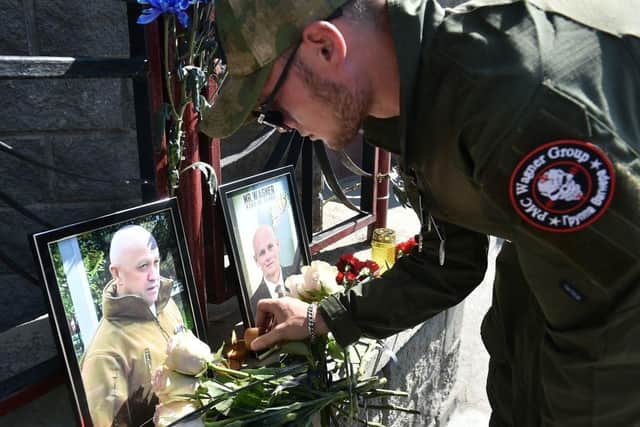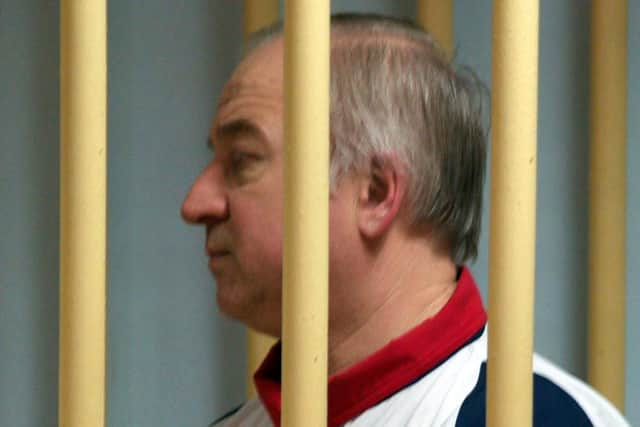Russian plane crash: What other mysterious deaths have been blamed on Russia? What has Vladimir Putin said about Yevgeny Prigozhin's 'death'?
As Russian president Vladimir Putin remains quiet on the plane crash that appears to have killed Wagner Group leader Yevgeny Prigozhin, few are convinced there is any chance it could be an accident.
When Mr Prigozhin launched his quickly-aborted coup attempt two months ago, details suggesting he had been quietly allowed to leave Russia and continue his work in neighbouring Belarus rang alarm bells with observers sceptical Mr Putin had backed down from his previous accusations the Wagner Group leader had committed “treason”.
Advertisement
Hide AdAdvertisement
Hide Ad"I think it’s a miracle he’s lasted so long – people have been punished for a lot less,” says Luke March, personal chair of post-Soviet and comparative politics and deputy director of the Princess Dashkova Russian Centre at the University of Edinburgh. “The timing suggests it’s co-ordinated, as it’s two months to the day since the march on Moscow.


"Putin doesn’t forgive people who he considers traitors and what Prigozhin did was so potentially destabilising that it was only a matter of time.”
Mr Prigozhin’s reported death – his name was listed on the plane that crashed on Wednesday night, alongside Wagner Group founder Dmitry Utkin and the pair are now being mourned by Wagner militants – is potentially the latest in a long line over the past two decades of people who have died in mysterious circumstances after angering the Kremlin.
Alexander Litvinenko
Russian defector Alexander Litvinenko was killed in 2006 by radionuclide polonium-210 poisoning, which was believed to have been administered through a cup of tea laced with the substance. The poisoning came shortly after he publicly accused Mr Putin of the assassination of Russian journalist Anna Politkovskaya, who was was shot dead in the lift at her apartment block in central Moscow.


An author of several books about the Chechen wars, as well as Putin's Russia, Ms Politkovskaya had also previously suffered – and survived – what was believed to be a poisoning, falling violently ill and losing consciousness after drinking tea.
Sergei Skripal
In 2018, Russian double agent Sergei Skripal was poisoned with nerve agent Novichok in the cathedral town of Salisbury. Mr Skripal, his daughter Yulia and a police officer, DS Nick Bailey, were poisoned, but survived. One woman, Dawn Sturgess, a member of the public who came into contact with the nerve agent, died.
The Skripals are now believed to be living in New Zealand under new identities.
Georgi Markov
Russia is known to have researched the science of poisonings carefully – long before Mr Putin’s time.
Advertisement
Hide AdAdvertisement
Hide AdPerhaps most famously, in 1978, Bulgarian dissident Georgi Markov died three days after being stabbed by a specially adapted umbrella containing the poison ricin on London’s Waterloo Bridge.
However, some critics believe there are a larger number of more deaths on British soil involving Russia than those that are widely known.
Scot Young
Dundee-born property developer Scot Young, who was impaled on iron railings after he fell from the fourth floor of his girlfriend’s flat in Marylebone, West London in 2014, was one of 14 people whom US intelligence officials suspected were assassinated in the UK by Russia’s security services or mafia groups.
A coroner ruled that there was insufficient evidence that his death was suicide and journalist Holly Blake, who investigated a spate of deaths of high-profile British businessmen around ten years ago, has said she believes the UK Government chose to turn a blind eye to suspicious deaths which had links to Russia’s elite.
In a 2019 interview after the publication of her book, From Russia with Blood: Putin’s Ruthless Killing Campaign and Secret War on the West, Ms Blake claimed a lack of appetite on the part of authorities to investigate came from hopes that Mr Putin could be brought around to co-operate with the West.
“What emerged was that the British government – in common with other governments in Europe and the US – was extremely anxious to court Putin in the hopes that he could be brought into the institutions, alliances that underpin the stability of the Western liberal world order,” she told Time magazine.
Ms Blake added: “Western officials are now waking up to the fact that it has been a huge mistake to turn a blind eye.”
Dr March points to a potential for a larger number of potentially politically-motivated deaths within Russia itself than is widely reported.
Advertisement
Hide AdAdvertisement
Hide Ad"There were rumours of lots of people falling out of windows, that kind of thing, early last year,” he says. “There's all kinds of suspicious deaths. We only see the high-profile cases, but there were quite a lot of things in the regions – unexplained deaths – to occur. Not a mass phenomenon, but often enough that it's still a way in which certain things are being resolved and you never fully know the causes behind them.”
Sir John Sawers, former head of intelligence agency MI6, said Mr Prigozhin’s death was a warning to others. “It’s not surprising there is any attempt to lay a fig leaf of denial over this, but the message it sends out to Russians is that you toe the line,” he said. “You don’t allow any criticism of the regime.”
Comments
Want to join the conversation? Please or to comment on this article.
